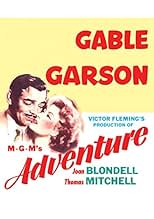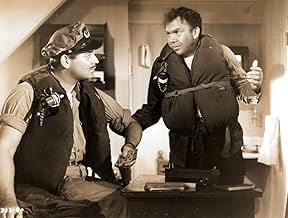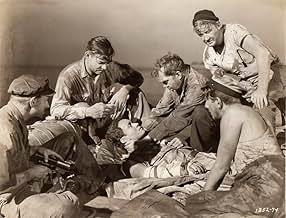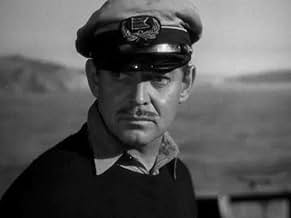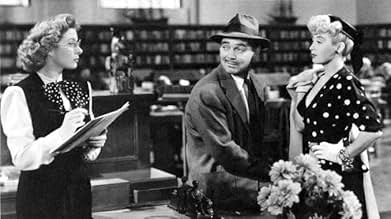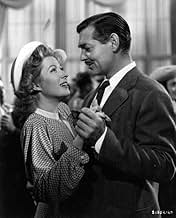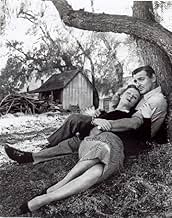NOTE IMDb
6,1/10
1,3 k
MA NOTE
Ajouter une intrigue dans votre langueDark, romantic, complicated drama about a rowdy merchant mariner and sophisticated librarian who clash over their lifestyles and values - and then fall in love.Dark, romantic, complicated drama about a rowdy merchant mariner and sophisticated librarian who clash over their lifestyles and values - and then fall in love.Dark, romantic, complicated drama about a rowdy merchant mariner and sophisticated librarian who clash over their lifestyles and values - and then fall in love.
- Réalisation
- Scénario
- Casting principal
- Récompenses
- 2 victoires au total
Stanley Andrews
- Bit Part
- (non confirmé)
Florence Auer
- Landlady
- (non confirmé)
Pedro de Cordoba
- Felipe
- (non confirmé)
Rex Ingram
- Preacher
- (non confirmé)
Garry Owen
- Jabbo
- (non confirmé)
Harry Wilson
- Big Mug
- (non confirmé)
Richard Abbott
- Clerk
- (non crédité)
Avis à la une
In his first film after World War II service in the Army Air Corps, Clark Gable settled down to a familiar character and one of his most familiar directors. Adventure was the last of five films that Gable did with Victor Fleming which also includes Gone With The Wind. This one never quite measured up to Gone With The Wind though.
Gable was literally met at the airport by Louis B. Mayer and rushed into this film. It was thought at the time that a film with current box office sensation Greer Garson was a can't miss item at the box office. Garson was coming off an Oscar she received in 1942 for Mrs. Miniver the year Gable went away to war.
The results were underwhelming, but seen over 60 years after it was first out show Adventure to be not a bad story at all. Gable fits comfortably into the part of the tough boatswain who loves the rollicking life at sea he leads. No woman is going to be tying him down, not one like prim and proper librarian Greer Garson. He likes them like her roommate Joan Blondell, sassy and out for a good time.
But Greer and her notions of settling down with home and family kind of get under his skin. It's what's led many a man to the altar.
Gable and Garson never worked together again, probably by mutual consent. Neither were each other's types on the screen and in life, but no one has anything to be ashamed of in Adventure.
Best performance in the cast is by Thomas Mitchell as Gable's friend and confidante. Mitchell plays the usual tragicomic alcoholic that he took a patent out on for the screen.
Another in the cast and former vocalist with the Xavier Cugat Orchestra is Lina Romay who is the woman we first see Gable with as the film opens. She would shortly be joining the Bing Crosby show as the featured female singer. That 'dame' who gets $20.00 for some conversation is none other than Barbara Billingsley aka June Cleaver. Who'd have thunk that one?
Though this one didn't set the world on fire, Gable's next two films, Homecoming and The Hucksters rank in my humble opinion as two of his very best. The King was ascending his throne again.
Gable was literally met at the airport by Louis B. Mayer and rushed into this film. It was thought at the time that a film with current box office sensation Greer Garson was a can't miss item at the box office. Garson was coming off an Oscar she received in 1942 for Mrs. Miniver the year Gable went away to war.
The results were underwhelming, but seen over 60 years after it was first out show Adventure to be not a bad story at all. Gable fits comfortably into the part of the tough boatswain who loves the rollicking life at sea he leads. No woman is going to be tying him down, not one like prim and proper librarian Greer Garson. He likes them like her roommate Joan Blondell, sassy and out for a good time.
But Greer and her notions of settling down with home and family kind of get under his skin. It's what's led many a man to the altar.
Gable and Garson never worked together again, probably by mutual consent. Neither were each other's types on the screen and in life, but no one has anything to be ashamed of in Adventure.
Best performance in the cast is by Thomas Mitchell as Gable's friend and confidante. Mitchell plays the usual tragicomic alcoholic that he took a patent out on for the screen.
Another in the cast and former vocalist with the Xavier Cugat Orchestra is Lina Romay who is the woman we first see Gable with as the film opens. She would shortly be joining the Bing Crosby show as the featured female singer. That 'dame' who gets $20.00 for some conversation is none other than Barbara Billingsley aka June Cleaver. Who'd have thunk that one?
Though this one didn't set the world on fire, Gable's next two films, Homecoming and The Hucksters rank in my humble opinion as two of his very best. The King was ascending his throne again.
I'm giving this movie 6 stars for the sheer pleasure of looking at Greer Garson, one of my favorites.
But I'd put this movie alongside "Remember?" as the weakest Garson films. For me, the problem was Clark Gable.
Gable is given the kind of typical "rough guy the dames falls for" role that made him a star...a combination of bluster and charm that won over Jean Harlow or Myrna Loy or Claudette Colbert.
Here, I think it's too much bluster and too little charm to realistically connect with Garson in the role she's given.
One pleasure here is seeing Joan Blondell -- she did lots of good work after the '30s musicals that she's best remembered for.
Also good: Thomas Mitchell.
Overall: see it once for the novelty of it, or skip it altogether,
But I'd put this movie alongside "Remember?" as the weakest Garson films. For me, the problem was Clark Gable.
Gable is given the kind of typical "rough guy the dames falls for" role that made him a star...a combination of bluster and charm that won over Jean Harlow or Myrna Loy or Claudette Colbert.
Here, I think it's too much bluster and too little charm to realistically connect with Garson in the role she's given.
One pleasure here is seeing Joan Blondell -- she did lots of good work after the '30s musicals that she's best remembered for.
Also good: Thomas Mitchell.
Overall: see it once for the novelty of it, or skip it altogether,
"Adventure" is an oddly generic title for such a singularly unique motion picture. Its superficial values are appealing enough--the Gable bluster is rarely put to such good use, and Garson is possibly the only actress with enough mettle to match him--but these attributes are hardly unusual and neither, indeed, is the storyline. What makes the effort favorably surprising is the story's aspiration to allegory through the use of poetics, which may occasionally seem overt but which never fail to ring true. It's an ambitious undertaking, and it works.
In its time, the movie was dismissed for being both formulaic and even crude, which in itself betrays either an ignorance of its higher aspirations or, more likely, a reluctance to take them seriously. America in 1945 prided itself on street smarts and industrial might; on its not being taken for a sucker. It had saved Europe from the axis forces and was about to embark on a socioeconomic boom such as the world had never seen: It wasn't interested in philosophical musings about the nature of the soul. The idea that these musings could be given dimension in a simple and often predictable story about a rakish sailor and a repressed librarian drove reviewers to pronounce the script "foolish" and the poetic commentary "gibberish."
But it is these very elements, this oddly ardent coloring, that have somehow deepened and mellowed with time, and which now provide the film with the kind of rich, subtle flavor found in only the most treasured vintages. More unique still is that the movie is less interested in the sentimentality of its story than in the metaphysical questions it poses. Its chief accomplishment is in avoiding any academic exploration of such questions (a choice which parallels the arc of the story itself), and it does so by illustrating with large, colorful brushes. Only the intelligence of the director and the skill of his actors keep the proceedings from veering off into caricature, a tipping point that when straddled with such finesse is delightful viewing indeed.
In its time, the movie was dismissed for being both formulaic and even crude, which in itself betrays either an ignorance of its higher aspirations or, more likely, a reluctance to take them seriously. America in 1945 prided itself on street smarts and industrial might; on its not being taken for a sucker. It had saved Europe from the axis forces and was about to embark on a socioeconomic boom such as the world had never seen: It wasn't interested in philosophical musings about the nature of the soul. The idea that these musings could be given dimension in a simple and often predictable story about a rakish sailor and a repressed librarian drove reviewers to pronounce the script "foolish" and the poetic commentary "gibberish."
But it is these very elements, this oddly ardent coloring, that have somehow deepened and mellowed with time, and which now provide the film with the kind of rich, subtle flavor found in only the most treasured vintages. More unique still is that the movie is less interested in the sentimentality of its story than in the metaphysical questions it poses. Its chief accomplishment is in avoiding any academic exploration of such questions (a choice which parallels the arc of the story itself), and it does so by illustrating with large, colorful brushes. Only the intelligence of the director and the skill of his actors keep the proceedings from veering off into caricature, a tipping point that when straddled with such finesse is delightful viewing indeed.
I was 8 years old when I saw this movie and it impressed me so much. I will never forget 3 things in the movie "Adventure". How to hypnotize a chicken; how the water drains out of the tub in a different direction depending on which side of the equator you live; how Clark Gable was yelling at his newborn baby to breathe.It was such a good romance, even to a young girl and I remember how the friend, Mudgin, was afraid of losing his soul. I am 64 years old now and it is still as fresh in my mind as it was in 1946 in Hartshorne, Oklahoma.
You have to see the movie to learn what "it" refers to. You will also learn how to lure chickens properly, how to regain your "soul", what San Fran looked like in 1945, how to attract a woman by dating her roommate, how to throw rocks at your lover, how snappy dialogue and lively acting can be much more entertaining than the 90% of the c**p in today's "subtle" acting movies. No "adventure" here in today's terms but quite daring and emotional in its own way.
Le saviez-vous
- AnecdotesAny reports of this film's financial failure are false. Variety (January 8, 1947) listed it as the #7 box office hit of 1946. (It was released December 28, 1945.) The film earned more than $6M worldwide and earned a profit for MGM.
- GaffesWhen the Buckleys drive away from Emily's house in the country, a clear reflection of the boom microphone can be seen on the right rear passenger window and other areas of the highly-polished car as it drives off.
- Citations
Harry Patterson: There ain't a dame I can't forget in six months.
- ConnexionsFeatured in Clark Gable: Tall, Dark and Handsome (1996)
- Bandes originalesDown in the Valley
(a.k.a. "Birmingham Jail")(uncredited)
Meilleurs choix
Connectez-vous pour évaluer et suivre la liste de favoris afin de recevoir des recommandations personnalisées
- How long is Adventure?Alimenté par Alexa
Détails
Box-office
- Budget
- 3 500 000 $US (estimé)
- Durée2 heures 5 minutes
- Couleur
- Rapport de forme
- 1.37 : 1
Contribuer à cette page
Suggérer une modification ou ajouter du contenu manquant

